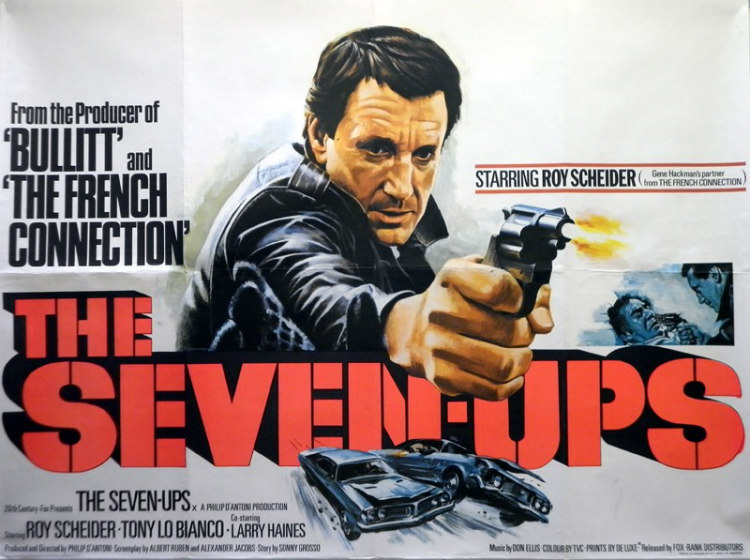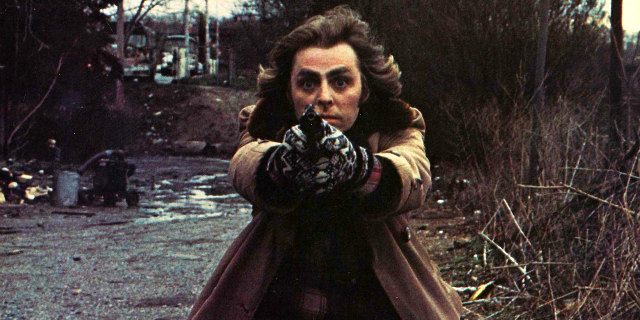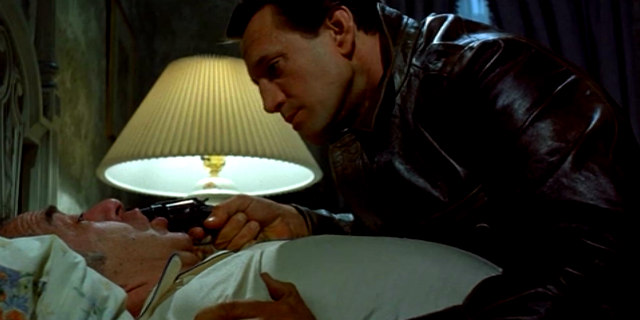
Review by Eric Hillis (@hilliseric)
Directed by: Philip D'Antoni
Starring: Roy Scheider, Tony Lo Bianco, Ken Kercheval, Richard Lynch, Larry Haines, Bill Hickman, Joe Spinell
This isn't the sort of movie you fast forward through to get to that one standout moment. It may not be as well remembered as Bullitt and The French Connection, but it's every bit their equal, if not their superior.

With 1973's The Seven-Ups, Philip D'Antoni joins the likes of Charles Laughton (Night of the Hunter) and Herk Harvey (Carnival of Souls) on the list of potentially great filmmakers who only directed one movie. Before turning to directing, D'Antoni was a successful producer, responsible for Bullitt and The French Connection, two cop thrillers best known for their epic car chases. In 1973 he decided to take a shot at directing himself with The Seven-Ups, a cop thriller best known for its epic car chase.


As with the two earlier films D'Antoni produced, his directorial debut has a lot more going for it than simply a great sequence of visceral vehicular violence. This isn't the sort of movie you fast forward through to get to that one standout moment. It may not be as well remembered as the Steve McQueen and Gene Hackman films, but it's every bit their equal, if not their superior.
The idea for the film came from Sonny Grosso, an NYPD detective who served as a consultant on the production of The French Connection. Roy Scheider's character in that movie, Buddy Russo, was based heavily on Grosso, who told D'Antoni of a secretive police unit known as 'The Seven-ups' that operated within the NYPD in the 1950s. The unit took its name from the sentences served by any criminals they nabbed - seven years and up! D'Antoni had the basis of a film with this concept, and Grosso gave him a plot by telling him about a series of kidnappings made by criminals posing as cops.
In the film, Scheider plays another Buddy, Buddy Manucci, and again the character is based heavily on the real-life Grosso. Due to sharing the same first name in both movies, The Seven-Ups is often incorrectly considered a direct sequel to The French Connection, which of course got its own official follow-up in 1975.
Buddy heads The Seven-Ups, his crew comprised of three others (Victor Arnold, Ken Kercheval and Jerry Leon), and uses unconventional methods to make arrests - in the opening sequence an antiques store serving as a front for counterfeiting is trashed to pieces. Aiding Buddy in his work is a childhood friend from the old neighbourhood, Vito (Lo Bianco), an undertaker with ties to the mob who doubles as an informant. What Vito doesn't inform Buddy of however is his involvement with a pair of hoods (Richard Lynch and stunt driver Bill Hickman, who coordinated the film's key chase, as he had done previously for Bullitt and The French Connection), who have a lucrative line in kidnapping mob bosses for ransom by posing as cops.


Investigating the disappearance of one such mafioso, The Seven-Ups stake out a funeral attended by the local crime bosses. Their man on the inside is identified as a cop however, leading the mobsters to mistakenly believe he's one of the kidnappers. This kicks off the film's bravura extended set-piece, which culminates in one of cinema's all-time great car chases.
With Scheider behind the wheel of a Ventura Sprint hatchback in pursuit of Hickman, driving a Pontiac Grand Ville sedan, the two traverse the streets of New York City at high speed, making their way over the George Washington bridge before the chase (which took four weeks to shoot) comes to an abrupt and breath taking end. It's old school, analog action cinema at its best, with two stunt drivers and a host of daring cameramen putting themselves at physical risk. D'Antoni maps out the sequence to perfection, displaying a sense of cinematic geography that most modern directors could do well to study; we always know exactly where both cars are positioned relative to each other. No shaky cam, quick editing shortcuts are necessary when a sequence is put together as well as this one. Editor Gerry Greenberg does an admirable job of cutting it all together, striking a balance between kineticism and coherence. Part of the reason George Miller won so much praise recently for his work on Mad Max: Fury Road is because he emerged from this school of filmmaking, whose studied, meticulous approach to action has sadly been replaced by the 'shoot the shit out of it and hope for the best' school attended by Michael Bay and his contemporaries.
Wrapped around this sequence we have a cop thriller that's as good as any that emerged in the early '70s, when the genre was at its peak. Were it not for a certain Spielberg movie from 1975, this could be considered Scheider's finest performance. In contrast to his meek Sheriff Brody and his laid back Buddy Russo, Scheider is scarily intense here, and when he's pushing around Joe Spinell's heftier frame, we genuinely believe that hoods would be intimidated by this guy! As the main villain, Richard Lynch is delightfully sleazy, and his performance here likely led to his being typecast for most of his career as a series of lowlifes and scuzzballs (there's barely a TV show from the '80s that didn't feature a guest appearance from Lynch as a villain of the week).
 It's a shame D'Antoni decided to pack in directing after this sole outing, as he proved adept at putting together tense and adrenalin filled sequences in a realistic fashion in the manner of William Friedkin. We'll never know what else he might have achieved had he continued, but The Seven-Ups is a better movie than many filmmakers of prolific output can boast of delivering.
It's a shame D'Antoni decided to pack in directing after this sole outing, as he proved adept at putting together tense and adrenalin filled sequences in a realistic fashion in the manner of William Friedkin. We'll never know what else he might have achieved had he continued, but The Seven-Ups is a better movie than many filmmakers of prolific output can boast of delivering.
Help support The Movie Waffler by sharing this postWrapped around this sequence we have a cop thriller that's as good as any that emerged in the early '70s, when the genre was at its peak. Were it not for a certain Spielberg movie from 1975, this could be considered Scheider's finest performance. In contrast to his meek Sheriff Brody and his laid back Buddy Russo, Scheider is scarily intense here, and when he's pushing around Joe Spinell's heftier frame, we genuinely believe that hoods would be intimidated by this guy! As the main villain, Richard Lynch is delightfully sleazy, and his performance here likely led to his being typecast for most of his career as a series of lowlifes and scuzzballs (there's barely a TV show from the '80s that didn't feature a guest appearance from Lynch as a villain of the week).



